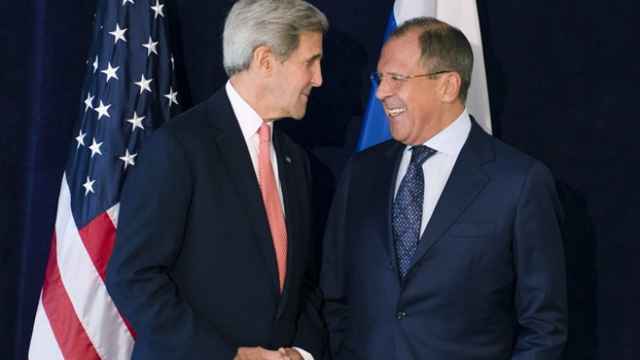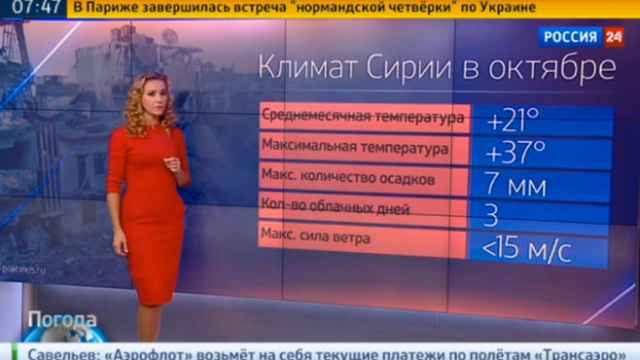Last week, Svetlana Alexievich became the first Russian-language writer in 28 years to nab the Nobel Prize for Literature. Which is, of course, the news of the decade, worth hailing and discussing everywhere from television shows to veggie markets — if only to decide whether Russia can claim dibs on a Belarussian citizen writing in Russian.
State television made some half-hearted noises, proclaiming her the wonder of Russian culture, while the more obtuse pro-Kremlin trolls called her a literary nobody because she writes non-fiction (and in reality, because she, like every good writer, doesn't like the government). But really, nobody cared.
Instead, the obsession of the week was the investigation into flight MH17, shot down over eastern Ukraine last year. Russian state firm Almaz-Antey — which made the missile that killed the plane and 298 innocent people on board — rolled out a report, complete with footage of explosions and forensic mathematics, proving that the missile in question was only used by Ukraine.
The Dutch investigation showed that the missile was in fact of the type used by Russia. But here, nobody heard, because Almaz-Antey had the backing of 1,000 propagandist voices, including those in the Kremlin and on state television, all lambasting the Dutch, the Ukrainians, the Yankees and everyone else from here to Alpha Centauri.
But try to guess which of these two news items will be remembered 20 years from now. And no, "Almaz-Antey" is not on the list of permissible answers. The added irony is that both stories concern the same thing — non-fiction reports of important stuff. It's just that Alexievich is good writing — searing and heartfelt, and Almaz is bad prose — full of plot holes and narrative inconsistencies.
If Alexievich is non-fiction's J. K. Rowling (may both ladies forgive me the comparison), Russian official reports are the pulp fiction about spetsnaz warriors you find in train stations across the nation that really should be published in rolls, not book form. But let's talk more about missiles.
Rockets to the Antarctic
One area unexpectedly hit by Russian missiles was the Antarctic. Not literally, but the Russian expedition in the Antarctic said this week it is mothballing its research on the ground because it ran out of money.
This includes, above all, the drilling of Lake Vostok. You know, the prehistoric lake sealed under ice for up to 25 million years, possibly storing a unique microbe colony that could give mankind invaluable insights into the past of our planet and life in other places, such as Jupiter's satellite Europa, which also has an ocean under an ice shell.
It is also the same Lake Vostok which the Russians reached first after a decade-long drill race, beating the British and the Americans — possibly Russia's sole indisputable scientific breakthrough since 1991. The government did not miss its chance to reap PR gains at the time — ministers toured the place, and Putin was presented with a capsule containing 25-million-year-old water.
But when push came to shove, the money went not to the one scientific project Russia could be proud of, but to a military PR campaign that someone mistook for war for some reason. Please don't argue otherwise: At Russia's current rate of some 50 missions a day in Syria, it'll take it about four years to fly as many missions as the U.S.-led coalition, which, by universal admission, achieved squat. If this is war, then I am Greta Garbo (which I'm not).
Maybe they should report some ancient terrorist evil slumbering at the bottom of Lake Vostok. That'd free up some cash.
Not Just Oil
The no-money stories are no wonder: A new report showed that brand Russia lost one-third of its worth over the past year. It is now valued at $810 billion, or 24 times less than the U.S.
And this is really great news. No, seriously. Because the oil prices have more than halved over the same period, and many detractors were dead sure that there is nothing to modern Russia but the petroleum industry.
Turns out it is not true; I just wonder what else constitutes the brand now. Science is out of the equation, and so, alas, is the international reputation. Not much else comes to mind except fighter jets and UN bluster, but perhaps Tolstoy, Tchaikovsky and their ilk — all the way up to Alexievich — still prop up what looks like a dangerously mismanaged brand in need of a CEO reshuffle.
But salvation is just around the corner, and it is coming from Biisk in the Altai region. Never heard of it? Oh, but you will, because the city is setting up a new sport — pelmening. Yes, pelmeni, the Russian dumplings; apparently making them quickly (and in the right way) is a new sport. That'll rake in the dough; think of the broadcasting rights alone. Ring up NBC and tell them to dump the Olympics.
Customer Mistreatment
And meanwhile in Khabarovsk, a bear strolled into a shopping mall. It was nighttime, so the animal was unable to do any shopping, and then it was shot. Which is not that surprising — I am sure you have also caught the occasional glares from staff and security guards at Russian malls, clearly wishing upon you the same fate as bestowed upon this unhappy member of the Ursidae family.
But my point is, bears are still roaming the streets of Russia. So everything is in order.
Unfair Observer is the pen name of a Russian journalist that The Moscow Times has invited to observe the most brain-dead weekly developments in Russia.
A Message from The Moscow Times:
Dear readers,
We are facing unprecedented challenges. Russia's Prosecutor General's Office has designated The Moscow Times as an "undesirable" organization, criminalizing our work and putting our staff at risk of prosecution. This follows our earlier unjust labeling as a "foreign agent."
These actions are direct attempts to silence independent journalism in Russia. The authorities claim our work "discredits the decisions of the Russian leadership." We see things differently: we strive to provide accurate, unbiased reporting on Russia.
We, the journalists of The Moscow Times, refuse to be silenced. But to continue our work, we need your help.
Your support, no matter how small, makes a world of difference. If you can, please support us monthly starting from just $2. It's quick to set up, and every contribution makes a significant impact.
By supporting The Moscow Times, you're defending open, independent journalism in the face of repression. Thank you for standing with us.
Remind me later.






